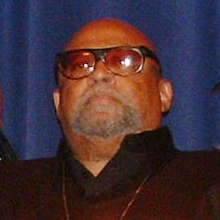A Quote by Van Jones
Though the rampant racial injustices throughout the criminal justice system were offensive to me and to millions of other people, I've never drawn a tight circle around the black community to define the limits of my moral concern. But that narrative tends to get imposed on you, if you're an African-American activist.
Quote Topics
Related Quotes
The U.S. has the largest prison population in the world: two million people. One out of every eight prisoners in the world is an African American. We are warehousing people as a profit to shareholders or for benefits to communities that get to host federal prisons. It is modern slavery. The whole future of America's black community is at risk. One out of every three young black men in Washington, D.C., is under one arm or the other of the criminal justice system. These are the continuing consequences of slavery.
The fact that more than half of the young black men in any large American city are currently under the control of the criminal justice system (or saddled with criminal records) is not - as many argue - just a symptom of poverty or poor choices, but rather evidence of a new racial caste system at work.
I don't think Dr. King helped racial harmony, I think he helped racial justice. What I profess to do is help the oppressed and if I cause a load of discomfort in the white community and the black community, that in my opinion means I'm being effective, because I'm not trying to make them comfortable. The job of an activist is to make people tense and cause social change.
The strike and its outcome had an enormous impact on the system of education and on our lives as well. The strike began as a response to the college's refusal to hire Professor Nathan Hare [the so-called father of black studies], and certainly unified the college around issues of justice. These issues were reflected in many communities: the Asian American community, Hispanic community, Native American community.
I want you to understand that racial justice is not about justice for those who are black or brown; racial justice is about American justice. Justice for LGBT Americans is not about gay and lesbian justice; it's about American justice. Equality for women isn't about women; it's about United States equality. You cannot enjoy justice anywhere in this country until we make sure there is justice everywhere in this country.
One of the ongoing crises in America is institutional racism. We have a very broken criminal justice system. We live in a country where there are more people in jail than any other country on Earth. There are some 2.2 million people currently incarcerated and they are disproportionally African American and Hispanic. Unarmed African Americans have been abused and sometimes killed while in police custody. Clearly these are issues that must be dealt with and changed.
We were segregated throughout the community, and it was pretty brutal, actually. It didn't appear to be, on the surface.People got along and we had great relationships, but there was discrimination that impacted adversely the ability of the African-American community to progress. People did not - were in denial about that fact.
A large portion of American citizens, especially people of color, have lost confidence in our criminal justice system. Many have called for appointing special prosecutors when a police officer kills or injures a civilian. If you were elected president, would you publicly support special prosecutors in these cases and what is one other thing you would do to fix our broken justice system?
I'm grateful to see my work flourish in my lifetime. Many of the great people in our history were not able to see how much their work, suffering and sacrifices enriched our lives and pushed our struggle forward. But I've been blessed to see my work begin in a family home, spread around the world and be embraced by millions of African people throughout the world African community.


































